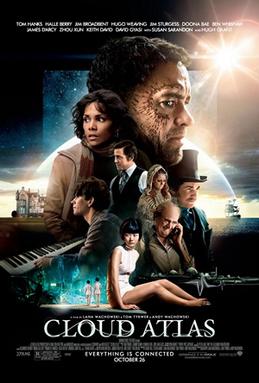Organised as a disparate sequence of six stories, the novel runs from the 19th century Pacific through to a distant, post-apocalyptic Hawaii. This baroque structure is then further complicated by the ingenious splitting of each story, bar the final one, into two parts hinged on a cliffhanger. And then it's rounded off by having each story take a completely different setting and form, including a austere diary, a pulp thriller, a retirement home-set farce, and a future corporate dystopia. Strangest of all, it somehow hangs together, in spite of the only formal connections being inconsequential cross-references and the possession by certain characters of a comet-shaped birthmark. What it all means is very much left to the reader, but it certainly left me with a pleasing, if passing, sense of the connections between people.
Given the preceding, not the most obvious novel to film, and I was certainly surprised to hear that it was even being considered for translation to the screen. Even more so when I heard that no less than the Wachowskis were helming it. Known best for their rather bombastic Matrix trilogy (one genuinely excellent film, two self-absorbed travesties), they certainly didn't strike me as even on the radar for adapting such a work.
All of which goes to show how one (well, this one) can so easily prejudge, and misjudge, things. The resulting film, while still far from unqualified recommendation, actually hangs together very well, and is probably about as good a version of the book as it is possible to make. One early concern that I had was that the innovative structure of the book was ditched in favour of a narrative that jumped back and forth between the component tales pretty willy-nilly. But since the stories contain connections in content, themes and pacing this actually works pretty well. For instance, the novel's cliffhangers that divide each story into two halves, are interlocked in the film in a way that seems surprisingly natural.
It's not all plain sailing, however. Some of the texture of the novel, in particular the different forms of the original stories (diary vs. letters vs. pulp), gets lost along the way, though that's more a limitation of film in general than this film in particular. The story that arguably loses out most here is the final, post-apocalyptic one, where the voice - and perspective - of the protagonist, Zachry, is pretty pivotal to the arc of the story, but this largely has to be covered by Tom Hanks' adopting an intermittently incoherent dialect for the film. And the film makers have definitely made a few changes that make the conclusions of the stories veer a little more into heart-warming territory. Nothing too serious, mind, but it did serve to make the resolution of the film a little more pat.
Notwithstanding my earlier praise, however, I'm not sure what someone unfamiliar with the original book might make of it all. It is still a pretty confusing film, one that may be extremely difficult to follow except by multiple viewings. So though I left as a qualified fan, the film's reputation as a fiasco is easy to understand. On the one hand, a film should stand or fall based on whether it's accessible, but on the other hand, surely there's a place for films that require a little more dedication from viewers? Of course, if that dedication requires the pre-consumption of the source novel, perhaps not. So, overall, though teetering on the brink of disaster more-or-less throughout its running time, I'd still label it a "secret success". But one might need to read that novel first ...








No comments:
Post a Comment